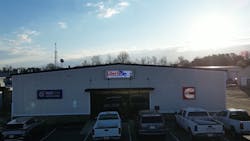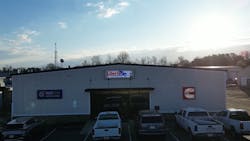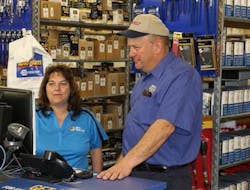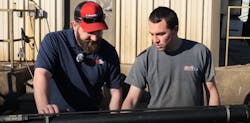Passing the torch: How a truck repair shop transitioned from father to son
Key Highlights
- Transitions in a family business can cause friction unless there's clear communication between all parties throughout the transaction
- Liberty Fleet Solutions, a truck-repair shop located in Fredricksburg, Virginia, transitioned from founder, Bob Chambers, to his son, Bobby Chambers, in 2019.
- Throughout the process, Bobby expressed clear interest in owning the shop, gradually took on more responsibility, and he and Bob maintained clear legal boundaries on the road to ownership
Done right, there are plenty of upsides to running a family-owned repair shop. When all or most of your coworkers are related, you (hopefully) already know how to communicate with each other, understand strengths and weaknesses, and trust that everyone wants the business to succeed. Every shop should aspire to have these characteristics, but it's just baked into a family shop. But one element that still can provide challenges is when it's time to pass the torch to the next generation.
For this to be successful, both the legacy owners and inheritors have to make certain compromises.
For more on LFS and family transitions:
“When you watch a business transition, it takes two,” explained Bobby Chambers, president of Liberty Fleet Solutions (LFS), a commercial repair shop based in Fredericksburg, Virginia. In 2019, Bobby bought the shop from his father, Bob Chambers, and learned quickly some decisions would need to be made.
“Somebody has to give away the responsibility, and somebody has to take the responsibility," Bobby said. "And sometimes when a transition is not working out, you're never sure whether a dad's not giving it up or the sons won't take it.”
No matter which side of the generational divide is derailing the hand-off, a sour business relationship can quickly tarnish a family’s relationships, and visa versa.
To help avoid this, Sara Hey, president of business development at Bob Clements International and the founder’s daughter, outlined several basic questions to ask during family transitions at NATDA's Trailer Tech Expo:
- Does the next generation want to run the business, or are they too nice to say no?
- Are they ready to handle the late-night calls, inventory headaches, and customer emergencies? Are they equipped to handle the responsibilities, or do they need further training?
- Are there clear expectations and plans for the transition, including the buyout amount or gifting process?
For an example of how these steps work, here’s how the Chambers' succession plan was enacted, all while maintaining their strong family relationship.
Family history
Bobby grew up in the shop, accompanying his dad there since the 1990s. Even as a "tiny kid," Bobby swept the floors and took friendly “crap” from the technicians, particularly when he got into the messes that kids do, his father recalled. One such instance was when Bobby was five years old, and he ended up playing in one of the oil drain pans. Afterwards, he came back covered in engine oil from head to toe, much to the technicians’ amusement.
"He was squawking at the top of his lungs, 'They're laughing at me!’” Bob recalled. '"Well, you did something stupid, I’m laughing too,’ [I replied].”
But Bobby kept that interest in technical work, and went to college to earn his degree in mechanical engineering at Virginia Tech around 2008.
“He left home and he had no intentions of ever coming back,” Bob said. “It was a big world out there and he was going to go find it.”
It turns out Bobby's path would lead him back to busted trucks, engine oil, and jocular techs.
Step 1: Do they want the business?
The first thing a succesful family shop tranistion needs is, of course, a willing successor. If you give anything you cherish to another, and they don't appreciate it equally, that thing—be it a car, a family heirloom, or a business—won't have much value for long.
After Bobby graduated from Virginia Tech in 2010, he wnated to live his own life, not his father's. He got an engineering job with a heavy-equipment management company called Kiewit. There, he “was in charge of bringing in millions of dollars of equipment assets onto the job site and setting up a full maintenance program,” Bobby said.
He was on his own, but still developing skills that would be useful at LFS.
“Kiewit is one of the best companies I've ever seen at managing their fleet of equipment,” he added. “And I got to experience that.”
But there's still no place like home.
In 2015, Bobby began to grow tired with the bureaucratic negotiations in such a big company. One day, he called Bob to ask to come back to LFS, convinced that he was going to be fired. When his father asked why he was so certain, Bobby said that after an eight-hour meeting between Kiewit purchasing agents and another construction company on what gloves they were going to use, Bobby bluntly said that what Kiewit already had worked.
“He said, ‘I just can't deal with that kind of politics,’” Bob said. “’I'm used to working for some place that even if you don't like the decision, it's a decision, and we can move forward with making progress.’”
So, Bobby returned to Fredericksburg and LFS, where he started handling front-desk and service-writer duties. But his experience managing equipment with Kiewit had shaped what he wanted to do with his future. After not just repairing equipment but fully managing it, Bobby knew “‘That's what I want to do. I want to help companies manage their fleets, I don't just want to be a repair shop.”
Step 2: Are they equipped to handle the responsibilities?
Even if a child or other relative is willing, you also have to make sure they are able. And then take some time to pass on the skills and wisdom they need to manage the business even better than you.
When Bobby came to the shop, it was time to see if that "tiny kid" could fill his father's big shoes. This was especially important because Bob was starting to think about his exit strategy. He needed to know the next owner was able to represent the sales side of the business as well as the mechanical side.
“I firmly believe that if you as the owner can't sell what you’re doing, nobody else can,” Bob affirmed.
So, as Bobby was working as a service advisor, he also started working for NAPA as an outside salesman. At this point, Bob had five or six NAPA locations and one Liberty location.
“It was some of the best experience and best education I've ever had in my career, being on the road selling, being customer facing, and solving people's problems,” Bobby stated. “If they needed parts, I could get them parts. If they didn't know what they what to do with the parts, I could send a mechanic.”
Plus, Bob noted, while Bobby was out in the field, that face-to-face experience taught him how to work with all kinds of people, including those that Bob referred to as “curmudgeonly.”
“In the parts world, most of the people that are in it are old enough that they feel everybody's got to put in their dues,” Bob said. “They're going to test you.”
And Bobby was, he admitted, with certain customers teaching him the mettle he’d need to run LFS one day through experience.
Step 3: Are there clear expectations and plans for the transition?
Finally, lay out the groundwork for the actual hand-off.
After three years of working and learning, in 2018, Bobby had saved enough money to buy 20% of LFS, with that ownership serving as a dry run to full-time ownership. Correspondingly, Bob began to spend less time with the company, with him and his wife buying an RV and spending more time on the road.
“Part of that getting in the RV and leaving was to see if we actually took the responsibility and dealt with it,” Bobby remembered.
Once Bobby had had about a year of working in LFS as a 20% owner, on Dec. 31, 2019, Bob and his wife signed the final paperwork that made Bobby the full owner of the business—as long as he made his payments.
After all, even as family, Bob and Bobby were careful to make sure that they honored each other as business partners as well, setting clear expectations for the transaction.
“We worked with our attorneys and with our CPA and with each other, and we came up with what we all felt was a fair, legitimate price for each of the entities,” Bob said. “They are legal, binding contracts.”
This made sure that everyone was on the same page, without any lingering resentments or confusion.
Now, Bobby has guided Liberty Fleet Solutions through a rebrand from Liberty Equipment to its current name, as well as refocused the business on serving trucks and fire trucks in particular. And he hopes to take his father’s legacy into the future, growing and expanding LFS to new locations and heights.
About the Author

Alex Keenan
Alex Keenan is an Associate Editor for Fleet Maintenance magazine. She has written on a variety of topics for the past several years and recently joined the transportation industry, reviewing content covering technician challenges and breaking industry news. She holds a bachelor's degree in English from Colorado State University in Fort Collins, Colorado.




